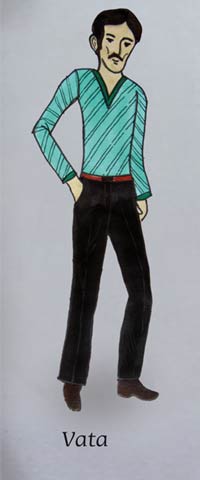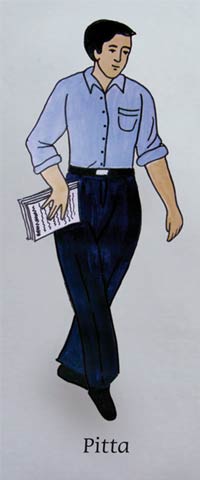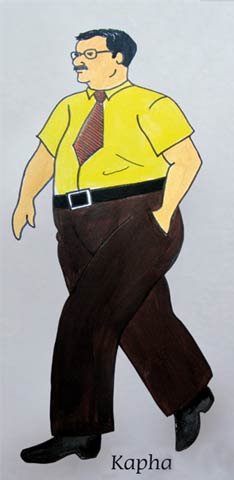The great playwright William Shakespeare is often quoted as having said: “All the world’s a stage, and all the men and women merely players.” Do you ever feel like life is just one big drama? We all have our parts to play, and our lines to say, and our days continue like a series of scripted scenes. Yet who is writing this script? Are we automatically reacting to the cues we are given, or is it that we indeed create our lives, and our relationships, as we go along? Let’s look for answers to these questions from the perspective of ayurveda.
The science of life
From the centuries old philosophy of ayurveda, we can actually learn a lot of what we need to know, to help our relationships grow and flourish. Life is all about our interactions with others. Because we are in this world, we have a relationship with everyone and everything else around. And our most important relationship is with ourselves. When we know who we are, when we understand our place in the world, then we see how we fit in, and how everyone else fits in as well. This wisdom shows us our interconnectedness, and how we really are here to help each other in so many ways.
The ayurvedic concept of doshas, or mind/body types, gives us insight into our inherent nature. Our dosha is like a fingerprint, individual to each one of us. And yet, one of the doshas is typically dominant in our personality and physiology. When we know our dosha, we are given some direction as to how to bring out our strengths and overcome our challenges.
The air and space dosha

Vata dosha is made up of air and space. People who are dominant in vata generally appear to be long and lean. They have thin and dry skin, and you can often see the veins through the skin. The vata person tends to have cold hands and feet. Vatas are quick thinkers; they are creative, flexible and spontaneous. They have sparkling personalities and enjoy trying new things. However, when they are out of balance, then they become anxious. This happens when there is too much vata. People might see them as ‘flaky’ or ‘air headed’ because they have a hard time remembering things. Vatas can be disorganised and easily distracted. In nature, you can see vata in a hummingbird, flitting quickly from one thing to the next. The hummingbird exerts a lot of energy and gets worn out quickly.
Vata types often have a difficult time travelling. The movement causes an excess of air and space. This shows up as anxiety, nervousness, and even nausea. They might have a hard time getting to sleep, and may also become constipated. The best thing that vatas can do to stay in balance is abhyanga, a warm oil self-massage. Warm and oily is the opposite of cold and dry, so this is the perfect remedy. Abhyanga can be done in the morning, before a shower, or at nighttime, before bed. It’s also a good idea for vatas to sip warm water with lemon throughout the day. Vatas need to eat warm, cooked foods, especially while traveling, because their digestion is sensitive.
The fire and water dosha

Pitta dosha is made up of fire and water. Pitta dominant people have an average built, and are more athletic. Because fire is present, pitta runs hot. Pittas have warm hands, and often have some reddish qualities to their skin or hair. They can have freckles, grey hair or go bald at an early age. Pittas are highly intelligent. They make good business people, because they are discerning and they have strong leadership skills. However, when too much pitta is present, they come off as critical and bossy, and an excess of fire brings out anger and impatience. In nature, pitta is represented in an eagle. The eagle soars, thinks, and plans. When it sees what it wants, the eagle goes after it without hesitation, with determination and precision.
The hot months of summer are known as the pitta season and this is the time that pitta is more likely to get out of balance. This shows up as anger, poor judgement, or irritability. We want to cool down the pitta fire without extinguishing it. Cooling foods like cucumber and mint are very good during this time of the year. It is also important to protect the skin and the eyes from the sun, as pitta eyes are very sensitive to light.
The earth and water dosha

Kapha dosha is made up of earth and water. Those with a dominance of kapha are bigger boned, and a bit heavier than average. They have clear and moist skin, and thick lustrous hair. Kaphas also tend to have big eyes and full lips. They are beautiful. Kaphas are loving and loyal. They make wonderful teachers, doctors, and parents. Kaphas have an easy-going nature and are very patient. When kapha is out of balance they can lack motivation. They can seem lazy, stubborn, and possessive. In nature, we can see kapha in a swan, gracefully taking its time gliding across the water. The swan is relaxed and comfortable in its surroundings.
A kapha imbalance can show up as weight gain, depression, or as allergies. To keep kapha in check, exercise is vital. Kaphas need to exercise daily, to the point of sweating. They also need to be around people—socialising helps them to be happy. They are energised and stimulated when surrounded by good friends and engaged in lively conversation. When kaphas feel the urge to sit on the couch and eat, they should really call up a friend and go for a walk.
Every dosha complements the other
We would never expect a hummingbird to behave like an eagle. And yet, with our loved ones, we often find ourselves asking another person to change—to do something that is contrary to his or her nature. Expecting a swan to suddenly get up and flit around the flowers is absurd—just as it is to want a kapha person to get skinny and multi-task a dozen projects.
It takes all of the doshas to make the world function. We each have qualities that enhance our life here on earth. For example, in a business setting, it’s good to include each of the doshas on a team. The vatas will brainstorm and come up with the big ideas. The pittas will come up with a plan to manage the team so that the ideas can become a reality. And the kaphas will shore up morale, and make sure that the project is seen through to its fruition. We can work with our strengths to create an environment that serves everyone and achieves the best possible outcomes for the company.
First, ayurveda teaches us how to be the best that we can be, by staying in balance. When we are in balance, we think clearly and make the best decisions for ourselves. We are better in our relationships because we are confident in knowing who we are. In our personal relationships, ayurveda can teach us to love and accept people as they are. We can strive to help them stay in balance, and to be their healthiest and happiest.
There is a natural order, and balance to the Universe. That is often why we choose the partners we choose. We help to balance each other out. A pitta person can help a vata person to be organised. A vata person can help a kapha person to lighten up and have more fun, just by being around. A kapha person can help a pitta person to remember what is most important in life. When we learn to love and accept our partners, friends and associates for who they are, to recognise their nature, then our relationships will thrive. Ayurveda shows us the beauty and benefits that come naturally when we release any unrealistic expectations and learn to love ‘as is’ with an open heart.
This was first published in the May 2013 issue of Complete Wellbeing.


really article is very informative vaat ,pitta and kapha are denoted as air, fire and phlegm are not proper .
ayurveda is a great science of treatment and life style.